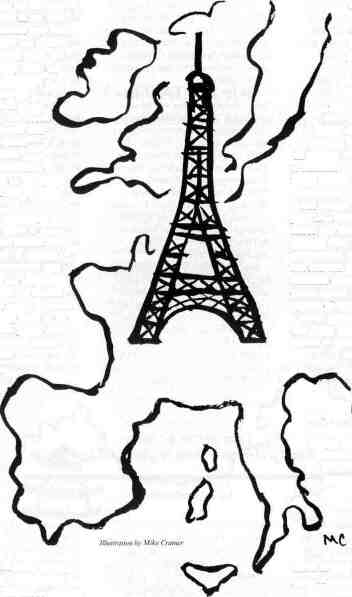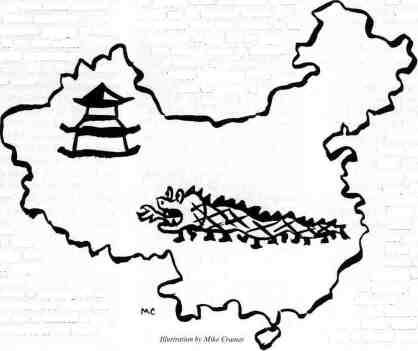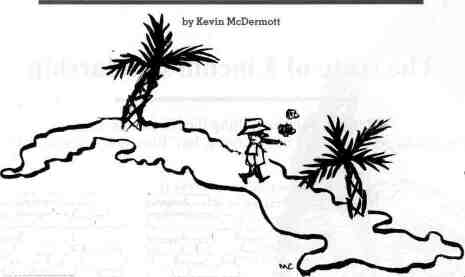

With its numerous corporate headquarters. Rep. Philip Crane's suburban Chicago congressional district is a showcase of the global economy. And Crane reflects that with his ardent free-trade philosophy, exercised through his role as chairman of the U.S. House Ways and Means subcommittee on trade.
But when he comes home, the Wauconda Republican has a hard time getting his constituents outside the corporate suites interested in the subject.
"When I talk about trade at town meetings, people start drifting off to sleep," Crane grumbles.
Yet world trade is anything but a mundane abstraction for Crane's 8th District or the rest of Illinois. In fact, it's the very lifeblood of the state's economy.
With exports valued at $36.5 billion in 1998, the last year for which complete data are available, Illinois ranked as the sixth-biggest exporting state in the nation. An estimated 700, 000 jobs are dependent on exports, from farmers to assembly line workers.
Yet, not everyone is convinced that globalization of the economy is a net plus for Illinois. Unions, even those whose members make the goods that are shipped to the far corners of the world, say the statistics touted by free traders don't take account of the thousands of jobs lost to imports and the movement of factories to Mexico or overseas. Those competing views were on display at last
December's ministerial conference of the World Trade Organization, the regulatory body that has come to symbolize the respective hopes and fears of trade advocates and their foes. While Illinois farmers and business executives went to Seattle to push an agenda of lower tariffs and open markets, union members and other activists filled the streets to decry what they view as a global capitalist monster that destroys the environment and exploits human labor. The battle will be rejoined later this year, as Congress debates giving China permanent "normal trade relations" status, which would grant the Asian giant the same favorable tariffs enjoyed by virtually every other U.S. trade partner. If Congress balks, U.S. corporations and farmers will not benefit from the lower tariffs and easier market access China has promised as a condition of its pending membership in the WTO.
The stakes are high for the Prairie State. China imported more than $1 billion worth of goods and
26 / February 2000 Illinois Issues
services from Illinois in 1998, putting it among the state's top 10 foreign markets. Though the sales volume has dipped in recent years because of the Asian economic crisis — and is a far cry from the $8.7 billion exported to the state's top trade partner, Canada — corporations and farmers see virtually unlimited commercial potential in the Mastness of China.
"Any time you're talking about 1.2 billion mouths to feed, that's a huge market," says Illinois Farm Bureau President Ronald Warfield.
Beyond mouths to feed, there are roads to build, a phone system to modernize, insurance to sell — prospects for Illinois companies like Caterpillar, Motorola and State Farm. Peoria-based Caterpillar, for instance, estimates that bringing China into the WTO will lop 55 percent off the tariff on an excavator made in Aurora and shipped to Shanghai.
"That's just the first bite of the apple," says William C. Lane, Caterpillar's director of governmental affairs in Washington. "As a member, China will have to play a role in further opening its markets."'
But the same forces that helped scuttle the trade talks in Seattle will be working Capitol Hill as Congress takes up China's trade status. They will aim at China the same arguments they used against the WTO, noting the communist dictatorship's notorious abuse of human rights and its disregard for the environment.
Even if Congress rejects normal trade relations, China will be able to join the WTO, but activists don't want Congress on record as supporting that membership. "China will really bring standards down," says Andrea Durbin, director of international programs for Friends of the Earth, an environmental group. "Since the WTO works on a consensus basis, any effort to incorporate labor and environmental issues in WTO negotiations will be really impinged by China."
Rep. Crane, who will lead the fight for permanent normal trade relations with China, believes he will have the votes to prevail. "The conditions that China agreed to are so significant in categories like agriculture that we have a potential to make an outreach to members [of Congress] who didn't have any strong feelings about it one way or the other," Crane says. China has offered to cut tariffs an average of 23 percent and allow more foreign ownership of telecommunications companies.
In fact, the vote will be a test of whether the "Battle of Seattle" was just a death throe for those trying to hold globalization at bay or the birth of a serious challenge to American trade policy.
"Up until Seattle, the conventional wisdom was it was going to be a hard fight but it looked like there was good probability of passage," says Jeffrey Schott, an analyst at the Institute for International Economics in Washington, D.C. "The question after Seattle is how firm a commitment the [President Bill] Clinton administration will have to pushing for this vote in the months before the general election and how much of an additional push Seattle gives to the opposition. Most people you talk to, their crystal balls will be all fogged up by the mists from Seattle. "
Toby Eckert is a Washington, D. C., correspondent for Copley News Service. His most recent piece for Illinois Issues, "Congress won't budge on Cuba embargo," appeared last November.
TROUBLE IN EUROPE
Illinois will feel the new order in global trade relations
by Bill Lambrecht

As a young congressional aide in Washington in 1968, U.S. Sen. Richard Durbin, an Illinois Democrat, missed his party's tumultuous National Convention in Chicago. But last December, Durbin made it to the gathering of the World Trade Organization in Seattle in time for the most explosive American protests since then. He was jarred by what he saw.
Arriving midway through the WTO ministers' meeting, Durbin found himself on the unpleasant side of a line of riot police in Robocop attire. They took their time letting him pass. The next morning, jogging in a "no-protest zone," Durbin was lectured by police for violating a pre-dawn curfew.
"There were scenes I thought I'd never see in my life in an American city," Durbin said later. "I felt like I was in the middle of an armed camp."
Beyond the disorder, what Durbin and others were seeing in Seattle was an emerging global populism that will leave its imprint on the WTO and international trade. The WTO — in effect, a government club with the power to set rules for international commerce — and indeed the world had been unprepared for the chaotic scenes in Seattle. Upwards of 40, 000 protesters clogged the streets, provoking a tear-gas enshrouded state of emergency and sapping the WTO's political will.
The weight of protests — along with a too-broad agenda of worker rights, the environment and biotechnology — collapsed the proposed Millennium Round of negotiations, sending 135 trade ministers home to wonder what happens next. It was a
Illinois Issues February 2000 / 27
miserable week for just about everybody in Seattle except the anti-WTO tacticians, who exulted in the final hours with a news release that read: "Ding Dong, the Talks are Dead."
They won't stay dead, given the exigencies of refereeing trade disputes in what is fast becoming a single global economy. But when the next round is resurrected — which may not occur until after the November elections in the United States — it is certain to be conducted more openly and, in the aftermath of Seattle, mindful that an anti-globalization movement has sprouted around the world.
The new political landscape surrounding global trade is something Illinoisans must reckon with. Just before the battles in Seattle, Gov. George Ryan estimated that 700, 000 Illinois jobs are dependent on exports. Illinois has 1.2 million AFL-CIO members, many of whom are alert to the brewing clash in the WTO over enforceable global labor standards. Illinois workers know what happens to them when companies go shopping off-shore for cheap labor.
Agribusiness also will be tuned in, none more keenly than Decatur-based Archer Daniels Midland, a $14 billion company. A final sticking point in the Seattle negotiations was U.S. insistence that the 15-country European Commission scrap its farm subsidy system. If European governments didn't prop up their farmers so liberally, the United States' $60 billion farm export business would grow.
In this era of Internet and transforming communications, trade negotiations still focus heavily on what sprouts in the dirt. And, as evidenced in Seattle, worries about genetically modified food — grown increasingly in Illinois corn and soybean fields — keep nations divided.
In just four farm seasons, the amount of land in the United States sowed with seeds engineered for insect control and production ease has leapt from zero to more than 76 million acres. In that period, a European resistance to genetic engineering has spread to Japan and Brazil, rooted in fears of safety, worries about multinationals' power over the food chain and, as biotechnology supporters note, protectionist sentiments.
The march of biotechnology will continue to collide with a countervailing resistance, at least until genetic science yields healthier foods and products that satisfy consumers. In Seattle, the WTO failed even to hammer out a new Biotechnology Study Group to start hashing out differences.
The WTO's next steps will be tricky, given new alliances spawned in Seattle. Labor and environmental leaders stood together amid the wafting tear gas — Teamsters in their satin jackets along- side activists wearing black-and-yellow monarch costumes, a reminder of perceived threats to butterflies from certain hybrids of genetically modified corn.
In the globalization of food, farming and labor, people see increasing threats to their sovereignty and their individual cultures. What Durbin and others saw in Seattle was a backlash against this globalization and the dawn of a new brand of civil-society politics in which people empowered by the Internet increasingly assert themselves through advocacy organizations.
Like it or not, what was left behind in Seattle when the tear gas lifted was a new order when it comes to global trade. In Illinois, it will be felt for years to come.
Bill Lambrecht, a Washington, D.C.- based political and environmental reporter for the St. Louis Post-Dispatch, covered the Seattle WTO meeting for his newspaper. He has won a national award for his global coverage of genetic engineering issues, and his most recent article on that topic for Illinois Issues appeared last September.
28 / February 2000 Illinois Issues
CUBAN CIGARS?
The states had better not wait for Washington to deliver on trade

Illustration by Mike Cramer
On a balmy Havana night in October, Illinois Gov. George Ryan and Cuban dictator Fidel Castro sat in Castro's presidential palace, tracing their fingers along an atlas.
How easy it would be, they marveled, for barges to load at Illinois ports near St. Louis or the Quad Cities, travel down the Mississippi River and take a straight shot across the Gulf of Mexico to Havana and other Cuban ports.
It was a wishful conversation at best — the U.S. government has banned American trade with communist Cuba for almost 40 years — but it illustrates the reality of a shrinking world: Any state that wants to enjoy the fruits of foreign trade had better not sit back and wait for Washington to deliver it.
Illinois currently has six foreign trade offices: in Belgium, Hong Kong, Japan, Mexico, Hungary and Poland. Each is staffed by two to five employees. Their job is to help Illinois businesses sell soybeans, agricultural machinery, computer equipment and such in countries where buyers might not know Illinois from Idaho.
At stake is an increasingly competitive foreign market worth about $36 billion a year to Illinois farmers, manufacturers and other industries.
The state's four top buyers of Illinois exports remain the expected ones: geographic neighbors Canada and Mexico, and industrialized allies Japan and Britain, in that order. But some of the biggest increases in Illinois business in recent years have been from buyers in less-well-developed markets: India ($337 million in 1998, up 67 percent from 1997); Russia (up 24 percent); the Dominican Republic (up 56 percent); the United Arab Emirates (up 31 percent).
The buyers are widely scattered - at least 41 foreign nations bought $100 million or more worth of Illinois goods in 1998, according to state and national figures — making the task of trade promotion and coordination that much more daunting.
"It's having people out there knowing what's going on," says Brian Reardon of the Illinois Department of Commerce and Community Affairs, which runs the trade offices. "We're in Hong Kong because it's the gateway to China. We're in Brussels to make sure we have the pulse of western Europe."
The notion of an American governor engaging in direct trade relations with a foreign power might still strike some citizens as odd, but in fact it's nothing new. Illinois opened its first foreign trade office in Brussels in 1968, making it the second state after New York to "go global."
Illinois has had a varying presence in almost every major region of the world since then, a presence created mostly by globe-trotting former Gov. James Thompson. By the time Thompson left office in 1991, Illinois had 12 foreign trade bureaus — more than any other state at that time — including offices in Moscow, Sao Paulo, Toronto, Barcelona, the Chinese city of Shenyang and two locations in Japan.
His successor, Gov. Jim Edgar, whose vision tended toward fiscal prudence rather than global presence, scaled back the foreign offices dramatically in 1991 and 1992, shutting down six.
Ryan has partly reversed that trend. In addition to his controversial interest in Cuba, the expansionist GOP governor is re-opening Illinois' shuttered Canada trade office, and said in last year's state-of-the-state address that an African office should follow. He has also hinted that South America, Israel and mainland China could be sites for future Illinois trade bureaus.
"We're trying to make sure businesses in Illinois have all the help they need finding new markets," says Ryan aide Dave Urbanek, "and finding new markets in a global economy means searching the world."
Kevin McDermott is the Illinois Statehouse reporter for the St. Louis Post-Dispatch. He trawled with the governor to Cuba last fall.
Illinois Issues February 2000 / 29
|
Sam S. Manivong, Illinois Periodicals Online Coordinator Illinois Periodicals Online (IPO) is a digital imaging project at the Northern Illinois University Libraries funded by the Illinois State Library |